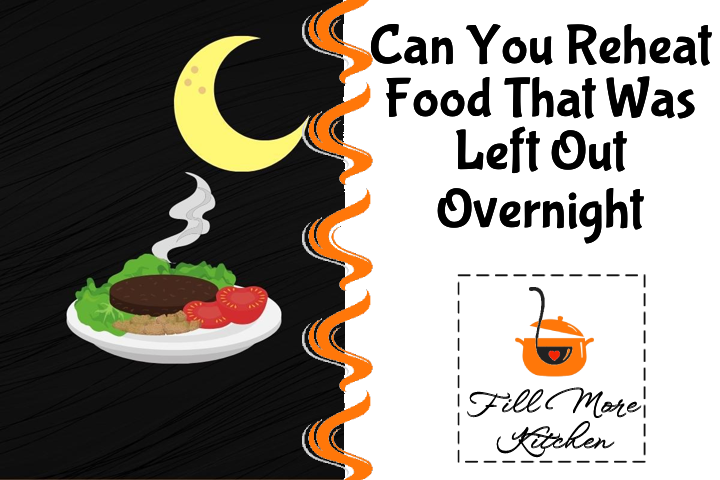After a long day of hard work, all you desire is to head home, have dinner, and unwind.
However, prior to reheating your previous night’s meal, you must ensure whether it is safe to do so or not, especially if the food was left out overnight. The response to this query might be unexpected!
According to the USDA, it is not recommended to reheat food that has been left out overnight due to the potential presence of harmful bacteria that can grow rapidly in temperatures between 40-140 °F and cause foodborne illnesses. These bacteria can multiply every 20 minutes, which means that perishable food left at room temperature for more than two hours should be discarded.
In this article, we will explore the hazards of consuming food that has been left out overnight and provide suggestions for preventing food poisoning. Prioritize your safety and savor your meal!
Is Leaving Food Out Overnight Bad?
It can be tempting to consume leftovers from the previous night, particularly if it was a satisfying meal, as we often have excess food that we don’t want to waste, which is not only detrimental to the economy but also unethical.
Leaving food out overnight is not recommended as it violates basic food safety principles and can lead to the growth of bacteria in the food, which can cause illness.
Leaving food out for hours can lead to unpleasant symptoms such as vomiting, diarrhea, fever, and other health issues, in addition to being unsanitary.
According to the FDA, it is not recommended to keep food at room temperature for more than two hours as this duration provides an ideal environment for bacteria to thrive and reproduce, which can pose a health risk if consumed.
Bacterial growth poses a considerable danger when reheating food that was left out overnight, and the following are some of the most frequent offenders:
- Staphylococcus
Staphylococcus, a cluster of microorganisms present on the skin of humans, has a high rate of proliferation and can result in various symptoms, with the most extreme cases leading to sepsis, which is a critical medical condition that can endanger life.
- Clostridium perfringens
Food poisoning can be caused by toxins produced by a bacterium commonly found in soil, which can lead to symptoms such as diarrhea, vomiting, and abdominal cramps.
- Listeria monocytogenes
These bacteria can lead to a serious infection called listeriosis, which has the potential to be deadly and is characterized by symptoms such as fever, muscle pain, and diarrhea.
- Salmonella
This bacterium is the cause of salmonellosis, a type of foodborne sickness that frequently leads to symptoms such as diarrhea, vomiting, and fever.
- E. coli
This bacterium can lead to food poisoning, urinary tract infections, and even death, and is commonly found in the intestines of animals.
How to Store Food Safely
To ensure food safety, it is important to refrigerate leftovers below 40 °F within two hours of cooking and reheat them to an internal temperature of 165 °F before consumption; a meat thermometer or instant-read thermometer can be used to check the temperature.
While it is possible to keep food heated overnight for safety, this would be an inefficient use of energy; a more environmentally and economically friendly option would be to refrigerate the food.
It is important to store your meal in the fridge within two hours of cooking if you cannot finish it in one sitting, as leaving it out for too long can result in the growth of bacteria on the surface of the food and increase the risk of food poisoning.
What Foods Can Be Left Out Overnight?
Regrettably, the response is not simple. Some foods that are safe to be left at room temperature for a few hours may become hazardous if they are left out overnight due to the rapid growth of bacteria in warm temperatures, which can lead to food poisoning if consumed.
Therefore, which types of food are safe to be kept at room temperature overnight and which ones require refrigeration?
The FoodKeeper App, developed by the USDA, provides recommendations for safe storage of various types of food and states that certain foods can be kept out overnight.
- Bread, rolls, and buns
- Snacks such as chips, pretzels, and popcorn
- Recently harvested produce
- Raw tomatoes, potatoes, and onions
- Honey
- Jellybeans
- Microwave popcorn
The following foods are safe when refrigerated:
- Cooked meat and poultry
- Cooked fish
- Eggs and egg dishes
- Milk and milk products
- Sour cream, cream cheese, and yogurt
- Mayonnaise
- Salad dressings
- Baked goods like cakes, cookies, and fruit pies
- Examples of spreads include peanut butter and jelly
- Casseroles and soups
can be reheated, but it’s best to do so slowly over low heat to prevent curdling.
The following foods should be frozen:
- Depending on the kind of fish, fresh poultry, meat, or fish
- Food items that have been cooked with meat or eggs, such as casseroles, soups, quick bread (like banana bread), and muffins, which are now leftovers
- Food items that have meat or egg in them, like quiche or custards, which are baked goods
- Products such as cheese spreads, dips, and sauces, as well as tortellini filled with cheese
- It is safe to freeze milk products that are cooked in a recipe, like quiche, but not those that are uncooked.
- Before freezing, it is necessary to cook raw eggs and egg dishes.
What if You Left Food Out Overnight in a Container?
Perishable food should not be left unrefrigerated for more than two hours, even if it’s sealed, as advised by the Food Safety and Inspection Service of the United States Department of Agriculture.
If you have left food out overnight, it is likely that the food has become unsafe to consume due to the potential growth of bacteria, even if it was stored in a sealed container as the seal does not provide protection against bacterial growth.
It is not always possible to detect harmful bacteria in food by sight, smell, or taste. Even if you leave cooked rice in a container overnight, it may appear fresh and have no odor, but there is a high likelihood that bacteria has grown on it, which cannot be detected through sensory cues.
It is only after consuming a specific food that one can determine if food poisoning has occurred. In the case of a restaurant, the entire kitchen may be closed until the problem is resolved. However, if it occurs at home or to an individual, what should be done?
If food has been left out overnight or for a prolonged period, it is advisable to discard it instead of consuming it to avoid falling ill. It is not worth risking your health just to consume leftovers.
Will Reheating Food Kill Bacteria?
Although reheating food can be a reliable method for eliminating bacteria, there are still some reservations.
It is important to note that bacteria have different survival rates under various conditions and do not necessarily die off at specific temperatures or times. Reheating food to a minimum of 149 degrees Fahrenheit for at least two minutes can eliminate some harmful bacteria.
Although reheating can kill most bacteria, Bacillus cereus, the most common type of bacteria that causes food poisoning, can survive up to three hours at 140 degrees Fahrenheit.
Although reheating food can eliminate most bacteria, there is no assurance that it will work every time. To guarantee the safety of your food, it is recommended to store and refrigerate leftovers immediately after they have cooled down from the initial cooking process.
Additionally, the act of reheating food has the potential to increase the strength of any bacteria present. Therefore, if you experience illness after consuming reheated food, it is advisable to seek medical attention.
Furthermore, if food is left out overnight, it provides ample time for bacteria to thrive and cause harm. Certain bacteria may even generate toxins and aflatoxins that persist even after reheating the food to eliminate the source of the bacteria.
Final Thoughts
If you are wondering whether it is safe to consume food that has been left out overnight, the answer is negative. This is because bacteria tends to multiply quickly in temperatures ranging from 40 to 140 degrees Fahrenheit, which is commonly referred to as the danger zone. Therefore, food items should not be kept within this temperature range for more than two hours.
If you want to ensure food safety, it is recommended to refrigerate any leftovers promptly and reheat them thoroughly before consumption. Additionally, it is crucial to discard any leftovers that have been left out for over two hours.
You can also check this video about “Can You Reheat Food That Was Left Out Overnight?”
Check out our 10 reviews!
Related posts
https://fillmorekitchen.com/can-you-use-an-oven-to-keep-food-warm/
https://fillmorekitchen.com/do-you-preheat-an-electric-oven/
https://fillmorekitchen.com/how-do-i-make-my-freezer-colder/
https://fillmorekitchen.com/can-i-put-frozen-veggies-in-a-rice-cooker-with-rice/
https://fillmorekitchen.com/how-long-can-you-leave-rice-in-a-rice-cooker/



